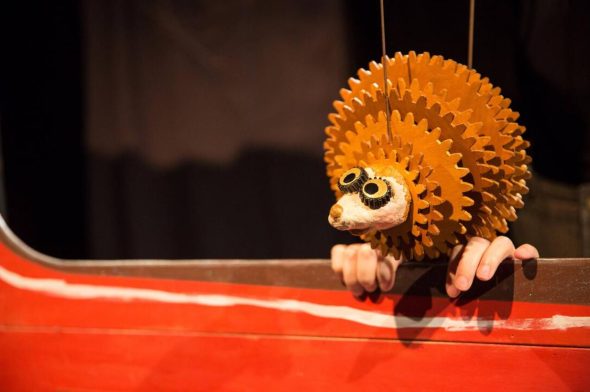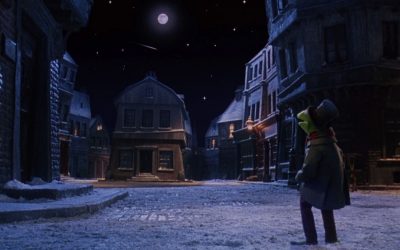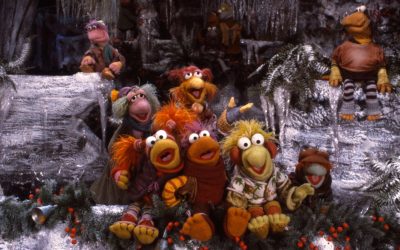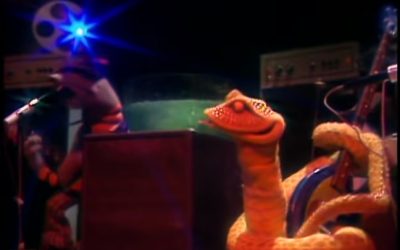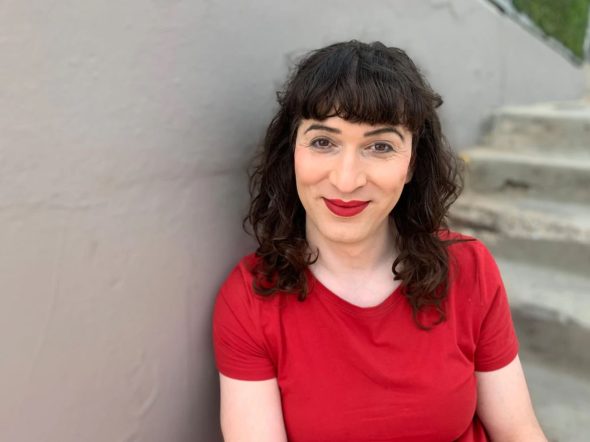
For this Pride Month at ToughPigs, we’re reminding you again that transgender people are just people in your neighborhood like everyone else. We’re not evil or weird, or even new, despite what a lot of people want you to think. We’ve always been here, living our lives, hanging out with our friends, and sometimes, making the art you love.
Case in point: The Jim Henson Company and Disney have worked with a number of trans and nonbinary puppeteers and performers over the years. They’re a part of shows you enjoy, like Muppets Mayhem and Fraggle Rock: Back to the Rock. So for Pride Month, I reached out to some of them and had amazing conversations with some of the most genuine, passionate artists I’ve ever spoken to. Below, I’m going to profile one of them and share some stories. Stay tuned this month for more profiles!
Stoph Scheer (she/her & they/them)
Henson / Muppet Projects: Slumberkins, Puppet Up, The Muppets Mayhem
The Beginning: Stoph Scheer is a nonbinary trans woman who has been fascinated by puppetry for her entire life. A fairly new member of the Henson crew, Stoph started working with The Jim Henson Company about two years ago, as part of their diversity training initiative. That led to some work with Disney; you can see her performance assisting Peter Linz’s Lips in the first episode of The Muppets Mayhem.
However, while she hasn’t been with Henson and Disney for long, puppets have been a part of her life forever. As she frequently jokes, “I’ve been picking things up and making them talk since I was very short, and I’m very tall now.” She says she would use anything with two pieces to represent a mouth, like scissors or a Styrofoam clamshell box, before eventually getting a Playskool Muppet Whatnot for Christmas and switching to that. Unsurprisingly, the works of Jim Henson resonated with them as a small child, including the Muppets, Fraggle Rock, and The Dark Crystal.
However, there weren’t many puppetry jobs available, so they turned instead to theater. (Sidenote: in a great example of how small the world is, Stoph performed in community theater shows alongside the fiancee of ToughPigs’ own Becca Petunia.) At theater school, Stoph was eventually introduced to Michael Vogel and Charlotte Wilde, the two German puppeteers behind the Figurentheater Wilde Und Vogel. Wilde and Vogel mentored Stoph, and introduced her to other puppetry styles. Her training with them would lead her to form her own puppet theater company, Doppelskope, as well as eventually getting a job with Henson.
The Diversity Initiative and The Muppets Mayhem: The Henson Diversity Training Initiative is a program designed to train puppeteers of marginalized groups, such as people of color and queer folks. Stoph heard about this program, applied, and was excited to get in. They say, “It was this intensive three week nine-to-five thing here in Hollywood. And at the time, I thought this was the peak. I wanted the training for its own sake, because I love puppetry and puppets and the art itself. This was the dream.”
Stoph mentions that she was impressed by Henson’s commitment to diversity. She recalls Brian Henson saying “Diversity in casting isn’t just important because it’s the right thing to do. It’s also important because it leads to better stories. When you have storytellers from different backgrounds, you can tell more stories.”
She notes that they did follow through with that goal: after a few months, Stoph was offered an opportunity to work on the Henson Apple TV show Slumberkins. From there, Stoph began performing with the live Puppet Up show on the Henson Company lot and at Knott’s Berry Farm. Stoph is proud that she got to help recreate many classic Henson sketches from the early years, such as playing the “Kermina” role in a reproduction of the classic “I’ve Grown Accustomed to Your Face” sketch and performing in the first performance of “Cool Jazz” in the United States since the 1960s.
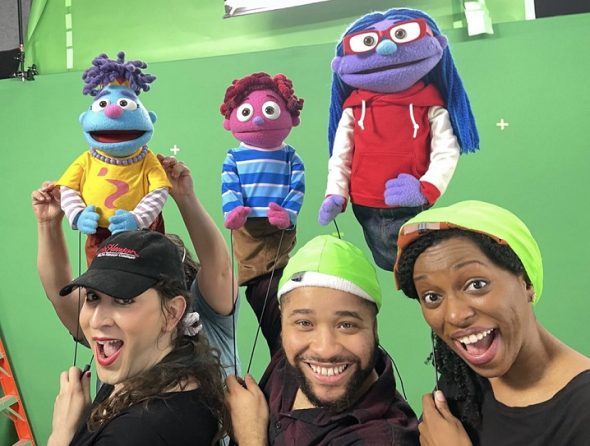
One day, Stoph was brought in to assist on Disney’s The Muppets Mayhem. Specifically, they assisted Peter Linz in the puppeteering of Lips. She says that “in the opening scene of Episode 1 [during the band’s performance of ‘Rock and Roll All Nite’], I am puppeteering Lips’s feet. Peter had me do this little touch-step move, and I was so excited that they kept that in the scene.”
She adds, “It’s huge to me to assist Peter Linz, Victor Yerrid, Alice Dinnean, Donna Kimball… They’re giants in our field and I’m being mentored by these fantastic artists. It’s kind of beyond a dream come true. I still regularly disassociate and think that this isn’t happening.”
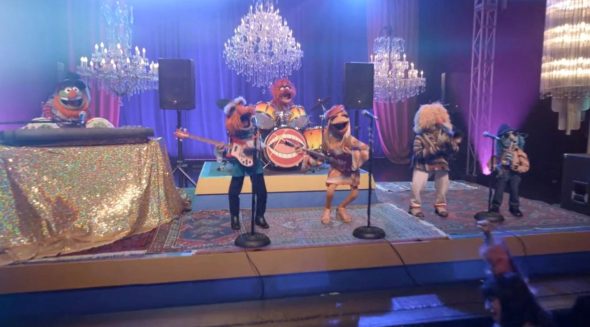
Other Projects: As mentioned, outside of her work with Henson and The Muppets, Stoph has worked on a number of puppet-themed projects. She says that the ToughPigs readers would “really like The Creatures of Yes,” a YouTube project by Jacob Graham to which she contributes as a puppeteer, co-writer, and producer.
She refers to it as “a time travel experiment,” where she and a fully LGBTQ+ creative team perform retro Henson-style sketches inspired by Sam and Friends and recorded using antique cameras and models. “In the first few years, [the queerness of The Creatures of Yes] was kind of implicit, but starting with a gay pride [miniseries], we have become more explicitly queer. At this point, two of the characters that I puppeteer are explicitly nonbinary.”
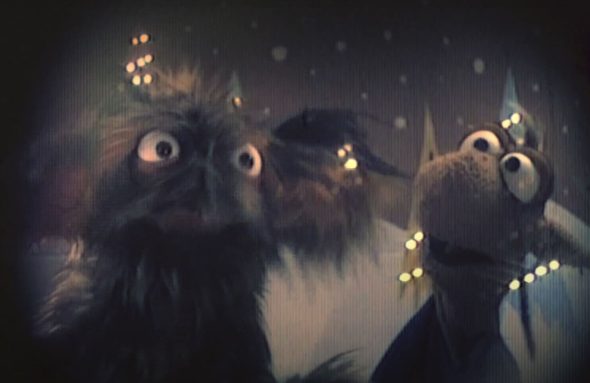
Stoph’s own puppet company, Doppelskope, co-founded with Ora Frutcher, recently received a grant from the Jim Henson Company to produce a stage show called The Amazing Story Machine. This show combines shadow puppetry, projections, and found object Bunraku-style puppetry to tell the story of the descendants of the Brothers Grimm attempting (and failing) to automate the storytelling process.
Lastly, with Doppelskope, Stoph created and appeared in an original musical called Gruff!. Stoph describes it as “a post apocalyptic climate change musical for family audiences, a deconstructed reinterpretation of The Billy Goats Gruff inspired by the events of the Standing Rock Protest.”
Final Message: I asked Stoph how puppetry resonates with them as a queer person. Unsurprisingly, she had a lot to say:
“Before the pandemic started, I was a puppeteer, but it was kind of a smaller slice of the pie of my life. My coming out story is very much tied to my transition into full-time puppetry. It helped that the pandemic took away the pressure of booking gigs and even the possibility of live stage performances.
During my stage career, which I still love and treasure, I was playing a lot of specific male archetypes. I already knew that I wasn’t cis, but I couldn’t conceive of doing anything with it. My egg hadn’t cracked. It created the space for my egg to crack.” (For those who don’t know, “cracking my egg” is slang in the trans community for the moment when you realize that you do not identify with your assigned gender.)
Stoph mentions realizing more about her identity while performing with Doppelskope co-founder Ora Frutcher. “We do this longform two-person improv show called Shrink: Puppet Therapy. [Even before I came out], Ora would refer to my characters as ‘Gretchen’ or ‘Julia’ or ‘my wife.’ That always made me happy, so that was an early crack in my egg.
“Shifting into puppetry was how I could continue being an artist on my own. The literal physical separation from the self and the character was the freedom that I needed to come out to myself, and growing my hair out, and not caring what gender people thought I was.”
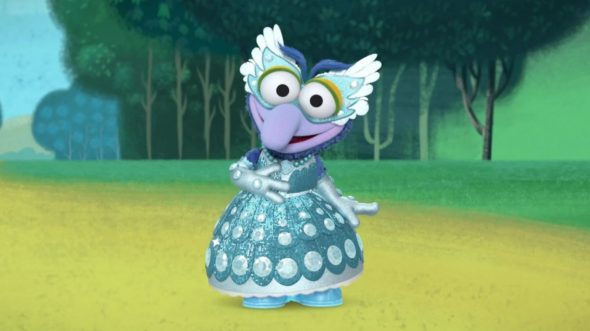
And of course, The Muppets helped her along the way. Stoph speaks fondly of people’s headcanons of a nonbinary Gonzo. “Before I knew why I cared about Gonzo, he was there for me as a role model and a comfort. There’s this aphorism I use, about how art should comfort the disturbed and disturb the comfortable. I was a disturbed little kid, and Gonzo comforted me.” In fact, they cite the “Gonzo-Rella” episode of the new Muppet Babies as helping her connect the dots to understand their identity during the pandemic.
Ultimately, Stoph feels that puppetry is a huge part of their identity. She states that “the animism of using performing objects isn’t inherently queer, but there’s some overlap in the Venn Diagram. The treating of nonhuman things with respect, agency, and autonomy fits into that overlap.”
Stoph’s website, with links to her many projects, can be found here: http://www.scheerbrilliance.com/
Click here to do a little touch-step move on the ToughPigs forum!
by Becca Petunia
